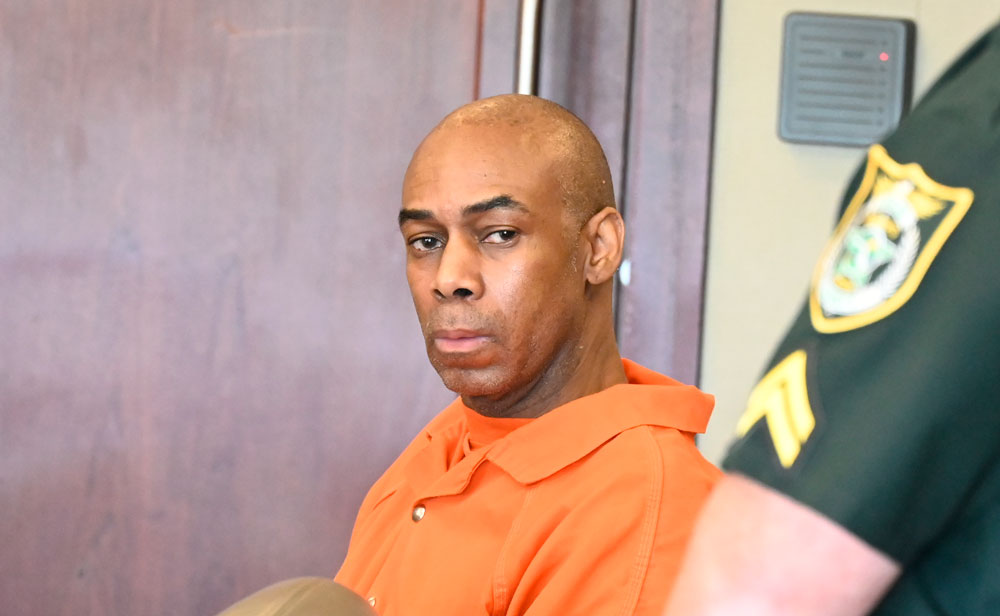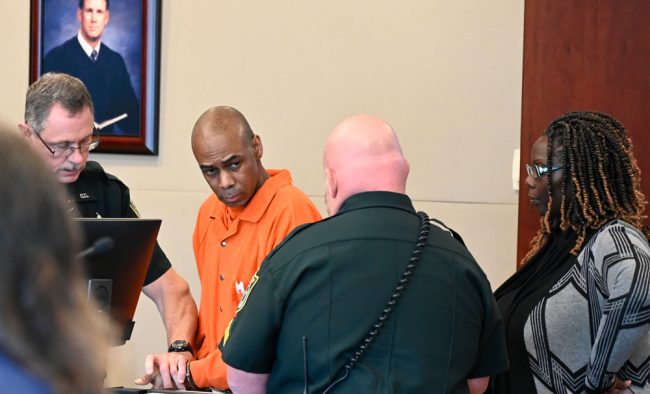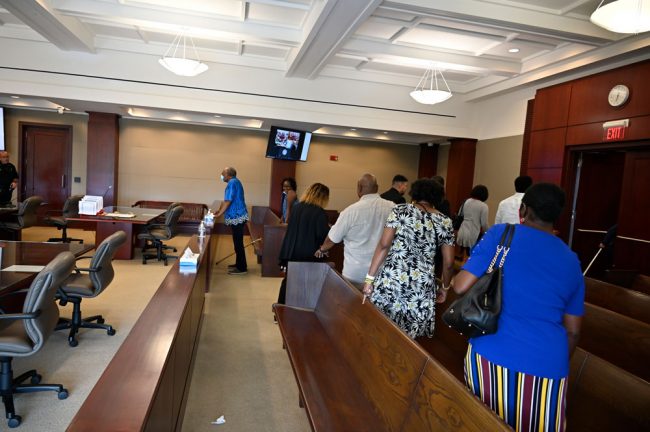
It had been one of Flagler’s more sordid cases in recent years, with every new batch of evidence amplifying the depravity of the 55-year-old man at its center. When Circuit Judge Terence Perkins pronounced a life sentence for Leon Norman Wiley Jr., at the end of a three-hour hearing that included shattering details from the step-daughter he’d raped, impregnated and pimped out since she was 12, the victim and her family, nine people who’d sat within feet of Wiley throughout the hearing, erupted in applause and gestures of victory.
The judge stopped them. “I just sentenced somebody to life in prison. There is no reason to celebrate that,” Perkins said, looking at the family.
It had been a grim three hours, though nothing so grim as the seven years of what the victim described as torture, manipulations, deceptions, threats, control and sadism–he would not only force her to have sex, but force her to hear him having sex with her mother–in addition to the incessant rapes by a man described as a sexual addict: his psychologist, who also testified on the defense’s behalf today, said he’d had 140 partners and had had sex twice a day every day until medicated, with a preference for pubescent or pre-pubescent children. Asked by the prosecutor if he’d married the victim’s mother to have access to her young daughter, the psychologist replied: “Absolutely.”
For all that, the psychologist told the court that he was not at great risk of reoffending if he was let out of prison after 10 or 15 years, since he is now 55. He’d been employed 18 years at Halifax Medical center in Daytona Beach, provided for his family, taken care of his mother. The defense attorney, Assistant Public Defender Regina Nunnally–who never goes less than all-out for her clients no matter the repugnance of the charges–had hoped that the weight of the psychologist’s testimony and Nunnally’s own arguments about the charges might result not so much in leniency, but a sentence more calibrated to the charges as filed in Flagler County: the family had moved here from Volusia when the victim was 17. Even discounting Wiley’s claim that he had stopped having sex with his step-daughter in Flagler on the “outlandish” grounds that he was so happy to be in a nice house here (as Assistant State Attorney Melissa Clark termed it), the sex would have been categorized as “unlawful,” not rape, Nunnally argued. So he should be punished with a commensurate sentence of 15 years, not life.
But by then the judge had heard the victim’s own statements as she sat in the witness box–again: she had also testified at trial. She answered questions that she could not answer during trial. She spoke about her six or seven other pregnancies that ended in abortions, pregnancies either he caused or caused by men he forced on her. She spoke about how “he let a man rape me and violate me and Mr. Wiley did nothing” (she called him “Mr. Wiley” today), about how he “crushed my spirit, my dignity,” and led her to suicidal thoughts and occasional attempts.
“I trusted Mr. Wiley to be a protector, a leader and everything a father should be,” she said. ” Mr. Wiley, on the other hand, did not have these things in mind. The only thing that he had in mind was to trick my mother to get to me, tricked me and forced me to do his disgusting sexual desires. He got no shame for the plan he plotted as a grown man to trick my mother to give me a nine year old little girl.”
DNA evidence stablished Wiley as the father, though Wiley’s nephew–whom Wiley had also forced on her–had first attempted to claim paternity to shield Wiley from prosecution, then blabbed all over school about the victim engaging in sex, humiliating her. That’s when she was 13.
“Judge,” she continued in a tone nearly deadened of emotions, “I have a little girl who is now nine years old. This sinks in for me so deep that a man would think that it’s okay to go after a nine year old little girl. My daughter is innocent, and she is precious. It further makes me detest the man who is sitting here in front of you today.”
Wiley, who had been slouching slightly when the victim’s mother–his ex-wife–spoke, had straightened up immediately when the victim began to speak and thrust himself forward like a listener interested in nothing else. but as the details fell from the witness box, he slouched again, started murmuring in Nunnally’s ear, and swiveled like someone bored or indifferent.
“This man took pride and joy in crushing my spirit, taking away my dignity, my peace, love happiness, and joy,” the victim read. “Because he knew if he could keep me so broken, I would never have the strength to get away. He completely hijacked my mind and thinking, making me know I could not trust or depend on anyone but him. I have been abused physically, mentally and sexually in unthinkable ways.” He not only forced men on her, but forced her to have her cell phone on during the encounters so he could listen in, either as a means of control or a further means of self-gratification. He coached her through every conversation, whether with men or with her own family members, and always hovered, or demanded that she stay by his side. She was afraid to tell and afraid he would leave her and her daughter without means.
If the victim’s statement hadn’t left the judge with very little room to maneuver away from a life sentence, there were others, that narrowed that path even more, especially from the victim’s mother: “Mr. Wiley attempted to erase her from the face of this earth before her time,” she said of her daughter. “Mr. Wiley took away her hopes and dreams, self esteem, confidence and trust in life and in people. Mr. Wiley led [her] to believe that he was the only person who would look out for her and my granddaughter. Mr. Wiley with great intent set out to abuse [her] in every area of her young life.”
She continued, “I know now, that [the victim] was not the only child abuse by Mr. Wiley. But when he is in prison for life, she will be the last. Mr. Wiley’s [punishment] should be forever and a day. Mr. Wiley should wear his garment of dishonor and shame. Mr. Wiley has earned it. A lifetime of imprisonment will never be enough to pay for what Mr. Wiley has done to a child. My child.”
And there were Wiley’s own father and mother. They, too, were in court, each walking with a cane, each speaking with as much difficulty as dismay and disbelief, though neither did what parents not infrequently do in similar circumstances: they did not deny their son’s crimes, only his monstrosity. They did not ask the court not to punish him, only to not punish him for life, though Nunnally had to almost coach his mother even to get to that point, because she made a startling revelation of her own.
As Wiley’s mother spoke, after a statement that had wandered and seemed incoherent, and after a very long silence, she suddenly found her voice. She told the court: “I have been molested. I have been raped,” she said. ‘The thought of a man, I couldn’t stand the thought of a man.” She became emotional. “We all got to account for our sins, we all got to account for our punishment. Wrong is wrong. pain is pain,” she said, crying, speaking of the victim what “what she was going through.” But when Nunnally asked if she wanted him to impose a life sentence, she was sure: “No. I don’t want somebody to do no life.”
Wiley’s sister, speaking from Orlando on his behalf, also spoke with no illusions. She commended the victim. “I respect my niece [] for coming forward and speaking her truth. I’m so proud of her,” she said. But she also asked: not life.
Wiley was last to speak. He stayed at the defendant’s table. And he did what many men in his position do. He said he knew what he’d done was wrong, but it wasn’t him. He blamed Satan. He said he was now a changed man, having found God. And he did what sexual predators of children do with almost predictable frequency: He blamed the victim: “I was afraid she would tell, so I was afraid to say no to her.” In other words, the 12-year-girl, the 13-year-old girl, the 14-year-old girl: she was the aggressor.
Clark, the prosecutor, didn’t let him get away with it. “You call it a mistake, but it lasted, when she was 12, 13, 14, 15, 16, 17, well into her adulthood,” Clark said. “
“And whenever she told you she didn’t want to have sex you threatened to take her baby away from her,” she told him. No, he replied, he continued only because he was afraid if he said no she would turn him in. He described himself as “kissing her butt” because he was afraid of her. He spoke at length, pleading, then crying, and repeatedly yelling that he loved the victim and her family, his ex-wife included, and when he said he loved his 9-year-old “grandchild,” the victim, who was sitting in the front row, her hand wrapped in both the hands of the victim’s advocate, couldn’t take it anymore. She broke down and sobbed and sough cover from the advocate’s body, as if Wiley’s pleas were like blows. When he kept invoking the family members’ names, Perkins, who could clearly see the effects of Wiley’s words, stopped him and reminded him clearly that if he wanted to make a statement about the sentence, he could do that. The judge didn’t want Wiley to use the statement as his latest proxy assault on the family.
So Wily went on, pleading against a life sentence and at one point saying he’d do 10, 15 years.
Wiley faces similar rape charges in Volusia County, which have yet to be tried. He admitted on the stand at his Flagler trial that he’d raped the victim in Volusia. Just not in Flagler. That was his claim. Nunnally tried to get to those numbers, 15 years in prison, by a different route, focusing the sentence on the specifics of the Flagler case, when the victim was 17 and 18. But the jury had returned a verdict of guilty on a charge of rape of a child younger than 18, which is punishable by life regardless.
It’s impossible to known when, in the course of a sentencing hearing–if even that late–a judge makes up his or her mind about a sentence. But it’s easier to surmise that in some cases, the decision is not as difficult as it could have been, nor as belabored. This appears to be one of those cases.

“There’s nothing I can say or do that in any way makes up for what happened to her over that time,” the judge said of the victim, prefacing his sentence. “I can remind her that when this was happening here in Flagler County, when she was a 16, 17-year-old young lady, that she was innocent and precious and all the things that she thinks about her 9 year old: she was that when she was young. And all I can hope is that she’ll recognize that, and maybe forgive herself a little bit for this going on. The second thing that’s really illegal issue, and that is that my job today is to sentence Mr. Wiley based on the jury verdict here in Flagler County for the cases and the charges here in Flagler County.”
And so it was life on the rape charge, 15 years on the charge of unlawful sex with a minor, to be served consecutively with the life sentence, and 15 years for Wiley’s tampering with a witness–he’d attempted to coax his ex-wife away from incriminati8ng him–to be served concurrently with the 15-year sentence.
Wiley showed little emotion when the judge spoke the sentence, other than nodding his head at one point. The crying and pleading of a few moments before had vanished. Maybe he was in shock. Maybe the tearful pleading had been a performance: He showed little emotion when he walked out of the court by the side door reserved for defendants, too, even as his parents, who had stayed after the victim and her family walked out, spoke to him and told him they loved him.
Perkins, the prosecution and his own defense attorney had given him the option to plead today to the combined charges in Flagler and Volusia. Wiley declined. He still wants to be tried on the two rape charges in Volusia, though absent an unlikely overturning of today’s sentence on appeal, that outcome is all but moot.
![]()






























John says
Rot in prison where you belong.
Coda876 says
Prison is too good for people like this.